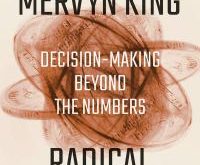from Peter Radford That’s the subtitle of Robert Skidelsky’s little book “What’s Wrong With Economics”?. A primer for the perplexed. With the U.S. election past us, I decided to start reading some of the books that had accumulated in my “to read” pile. Skidelsky being one of my favorite authors I started with his. The problem is that perplexity is insufficient to describe my usual emotion or state of mind whenever I engage with economics. So, here I am, a mere fifty or so pages in,...
Read More »Using ‘small-world’ models in a large world
from Lars Syll Radical uncertainty arises when we know something, but not enough to enable us to act with confidence. And that is a situation we all too frequently encounter … The language and mathematics of probability is a compelling way of analysing games of chance. And similar models have proved useful in some branches of physics. Probabilities can also be used to describe overall mortality risk just as they also form the basis of short-term weather forecasting and expectations about...
Read More »“Protecting Intellectual Property” against China means redistributing income upward
from Dean Baker The New York Times had an article discussing the prospects for U.S. trade relations with China during Biden’s presidency. At one point it tells readers: “Mr. Biden has given few details about his plans for U.S.-China relations, other than saying he wants to recruit American allies such as Europe and Japan to pressure China to make economic reforms, like protecting intellectual property.” Stronger and longer patent and copyright protections have redistributed enormous...
Read More »Tech platforms feel the heat
from C. P. Chandrasekhar In a move that was expected, the US Justice Department has filed an anti-trust lawsuit against internet search giant Google, alleging that it resorts to anti-competitive practices to ensure its dominance in the search engine space and, through that, over the related online advertising revenues. As a leading example the case cites the successful effort to exclude the competition through a deal, in place since 2005, in which Google pays Apple around $8-12 billion a...
Read More »Open thread Nov. 17, 2020
Graduate education in economics
from Lars Syll Modern economics has become increasingly irrelevant to the understanding of the real world. In his seminal book Economics and Reality (1997) Tony Lawson traced this irrelevance to the failure of economists to match their deductive-axiomatic methods with their subject. It is — sad to say — as relevant today as it was twenty-three years ago. It is still a fact that within mainstream economics internal validity is everything and external validity nothing. Why anyone should be...
Read More »Lowering the bar on success: Megan McArdle on drug development
from Dean Baker Washington Post columnist Megan McArdle was anxious to tell readers that drug development in the pandemic has been a great success story. After all, look at all the treatments we have, and now it appears that Pfizer/BioNtech have developed a highly effective vaccine. What could be better than that? Well, first we need a bit of perspective. Yes, we place an enormous value on our health and our lives, so getting effective treatments and vaccines quickly are extremely...
Read More »Imagining
Imagine a world where 70% of the 7.4 billion population lives in its developing countries. Imagine a world where more than 70% of the population is considered to be of low income. Imagine a world where, in one continent alone, most of that continent’s 1.2 billion population live in its underdeveloped nations. Now imagine raising the living standard of all these people to first world standards. Imagine how much energy it would take to provide them just the...
Read More »Why zero interest rates are here to stay
That’s the self-explanatory title of my latest piece in The Conversation. It’s wonkish, but important. As I’ve explained here and here, an economy with zero real interest rates works very differently from the kind we are used to. Share this:Like this:Like Loading...
Read More »“necessities of thought”
Concepts that have proven useful in ordering things easily achieve such an authority over us that we forget their earthly origins and accept them as unalterable givens. Thus they come to be stamped as “necessities of thought,” “a priori givens,” etc. The path of scientific advance is often made impassable for a long time through such errors. For that reason, it is by no means an idle game if we become practiced in analyzing the long commonplace concepts and exhibiting those...
Read More » Heterodox
Heterodox


